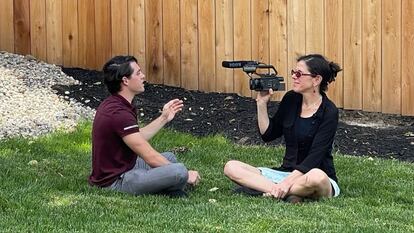Nancy Pelosi’s daughter visited the Trump supporters who wanted to hang her mother. It went well
Alexandra Pelosi directs the documentary ‘The Insurgents Next Door,’ in which she interviews those prosecuted and convicted for the January 6 attack on the U.S. Capitol in 2021. She tries to understand their motivations, but also argues with them

When a mob stormed the U.S. Capitol in Washington on January 6, 2021, many were shouting, “Where’s Nancy? Let’s hang her.” They were looking for Nancy Pelosi, the Democratic Speaker of the House of Representatives, who, along with Vice President Mike Pence (who was also being chased) and the rest of the members of Congress, were hiding from the rioters. The government officials were about to certify Joe Biden’s electoral victory. Filmmaker Alexandra Pelosi, Nancy’s youngest daughter, wanted to understand the people who sought to hang her mother. The result is a powerful documentary: The Insurgents Next Door, which was released on HBO Max.
With her camera on her shoulder, Alexandra Pelosi visits a handful of insurgents who have been prosecuted or sentenced to prison. She sincerely tries to understand their motivations, though sometimes she jumps in to debate what they say. The conversations are all cordial. One conclusion: people are better one at a time than they are in a crowd. Something happens in the human brain when people are part of an agitated group. They call it herd mentality.
Some of the interviewees match the expected profiles, but even so, shocking things happen. Alexandra Pelosi talks to a man who has “Proud Boys” — the name of a paramilitary group that claims to be prepared for civil war — tattooed on his forehead. He’s a musician and in his songs he raps verses like, “Fuck you, Nancy, I hate that bitch, but I’d fuck her.” He plays it for Alexandra, who doesn’t react badly to it. The man has no regrets. He introduces her to his family, holds his baby in his arms. And the director accompanies him to the door of the prison to see him say goodbye to his family before he goes in. Another interviewee — perhaps the most grotesque one — believes all of the conspiracy theories, not only that the election was stolen but that leftists infiltrated the gathering to promote the attack on the Capitol for some unknown reason. He insists on showing Pelosi videos that prove nothing but which he interprets in his own unusual way.
But other interviewees defy all stereotypes: not all the people who stormed Congress, spurred on by Donald Trump’s hoaxes, fit the image of reactionaries. Several say they had voted for Obama before. There is even a young man who claims that he voted for Biden in 2020 but went to the Trump rally and then to the Capitol to accompany his sister. One is homosexual and has a husband. Another was a porn actor and speaks of how he unleashed his fury from his breakup with his girlfriend (it turns out she was a prostitute) after he gave her expensive gifts like an iPhone; that episode led him to conclude that the left wants to destroy the family. “You stormed the Capitol because you broke up with your girlfriend who was a prostitute?” a stunned Pelosi asks him. “Yes, we men are weird,” he replies.
It is clear that the personal can become political. Several of those who participated in the January 6 insurrection relate their role in it to their own traumas, failures or mental health problems. They vented their frustration by embracing the hoaxes (about voter fraud, about the pedophile plot, about globalism, about the replacement of whites) propagated by Trumpism and its allied media. One of the defendants celebrated the first anniversary of the insurrection in the following way: she got drunk, got into her car and drove in the wrong direction until she caused a fatal accident. She is also awaiting trial for that.
Most have not abandoned their sympathies for Trump, even after paying hefty fines, serving time in prison, or continuing to wear an electronic ankle monitor as a condition of their parole. Some do admit that they were disappointed, that those who stormed Congress expected their leader to go there and not abandon them to their fate. Only one, speaking from prison, expresses unreserved remorse; he is isolated because there are other “patriots” in his cellblock who consider him a traitor.
The documentary’s message is disturbing. These radicalized people who were ready to fight in the streets against what voters had decided and were even capable of hanging the authorities are not aliens; they are our neighbors. Alexandra Pelosi shows that dialogue is possible. The far-right tend to dehumanize those they consider their enemies: it would be a mistake to dehumanize them.
Sign up for our weekly newsletter to get more English-language news coverage from EL PAÍS USA Edition
Tu suscripción se está usando en otro dispositivo
¿Quieres añadir otro usuario a tu suscripción?
Si continúas leyendo en este dispositivo, no se podrá leer en el otro.
FlechaTu suscripción se está usando en otro dispositivo y solo puedes acceder a EL PAÍS desde un dispositivo a la vez.
Si quieres compartir tu cuenta, cambia tu suscripción a la modalidad Premium, así podrás añadir otro usuario. Cada uno accederá con su propia cuenta de email, lo que os permitirá personalizar vuestra experiencia en EL PAÍS.
¿Tienes una suscripción de empresa? Accede aquí para contratar más cuentas.
En el caso de no saber quién está usando tu cuenta, te recomendamos cambiar tu contraseña aquí.
Si decides continuar compartiendo tu cuenta, este mensaje se mostrará en tu dispositivo y en el de la otra persona que está usando tu cuenta de forma indefinida, afectando a tu experiencia de lectura. Puedes consultar aquí los términos y condiciones de la suscripción digital.









































